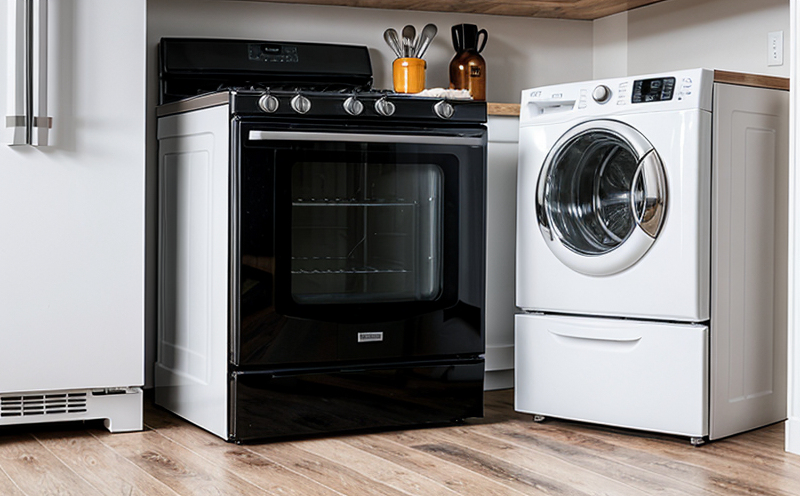Tensile Strength Testing of Appliance Cables
When it comes to ensuring consumer safety and product durability in household appliances, tensile strength testing plays a critical role. This form of mechanical testing is particularly important for the integrity of appliance cables, which must endure significant physical stress during normal use and accidental mishandling. Understanding how these cables perform under tension helps manufacturers identify potential weaknesses that could lead to failures or hazards.
The primary objective of tensile strength testing is to evaluate the maximum load a cable can withstand before it breaks. This metric is crucial for ensuring that appliance cables are robust enough to meet safety standards and consumer expectations. For instance, in washing machines, dishwashers, and other appliances, the cable connecting power sources to the device must be resilient against the pulling forces caused by movement or accidental tugging.
The testing process involves subjecting a sample of the cable to gradually increasing tensile forces until it reaches its breaking point. This is typically done using specialized mechanical testers equipped with grips that can apply precise loads. The specimen preparation for this test requires careful selection and cutting of the cable, ensuring uniformity in thickness and length.
Industry standards such as ASTM D412 (for thermoplastics) provide guidelines on specimen dimensions and testing procedures. Compliance with these standards ensures that the results are accurate and comparable across different manufacturers. The use of standardized test methods also helps regulatory bodies assess whether products meet safety requirements.
In addition to tensile strength, other mechanical properties like elongation at break and flexural modulus can be tested on cable samples. These additional tests provide a more comprehensive understanding of the cable’s material properties and help identify potential areas for improvement in design or manufacturing processes.
For quality managers responsible for ensuring product safety, tensile strength testing is an essential tool. By identifying weak points early in the development process through rigorous testing, manufacturers can improve their products’ reliability and reduce the risk of recalls or accidents. Compliance officers also benefit from this test as it ensures adherence to relevant international standards like ISO 9001 for quality management systems.
R&D engineers responsible for innovation within household appliance design can leverage tensile strength testing data to optimize cable designs, enhancing both performance and safety without compromising on aesthetics or functionality. Similarly, procurement professionals looking to source high-quality materials can rely on test results to make informed decisions about suppliers and material specifications.
Scope and Methodology
| Test Parameter | Description |
|---|---|
| Tensile Load | The maximum load the cable can withstand before breaking. |
| Elongation at Break | The percentage of stretching a material undergoes from its original length until it breaks during tensile testing. |
| Flexural Modulus | A measure of stiffness indicating the amount by which an object bends under load. |
The methodology for performing tensile strength tests on appliance cables involves several key steps. Specimens are cut from the cable according to specified dimensions detailed in relevant standards, ensuring consistency across all samples being tested. The specimens are then clamped into a tensile testing machine where they undergo increasing loads until failure occurs.
During this process, data such as force applied and displacement of the specimen is recorded at regular intervals. This information allows for precise determination of both tensile strength and elongation values. After completing each test run, samples are inspected visually to check for any visible damage or signs of impending failure that may not have been captured through mechanical measurements alone.
The results from these tests provide valuable insights into the durability and reliability of appliance cables under various conditions. Manufacturers can use this data to make informed decisions regarding material selection, design modifications, and process improvements aimed at enhancing overall product quality.
Industry Applications
Tensile strength testing is widely used across multiple sectors within the consumer products industry, particularly for household appliances where electrical wiring plays a critical role. Appliances such as refrigerators, washing machines, and dishwashers rely heavily on their power supply cables to function safely and efficiently.
In these devices, the cable connecting the main unit to external power sources must be durable enough to withstand constant pulling forces caused by movement during operation or accidental tugs while in use. By testing the tensile strength of these cables, manufacturers can ensure they meet stringent safety requirements set forth by regulatory bodies worldwide.
The results from such tests also aid in optimizing cable designs for better performance and longevity. Engineers can use the data obtained to identify optimal materials that balance cost-effectiveness with robustness, thereby improving overall product quality without sacrificing on price competitiveness in the market.
Why Choose This Test
- Ensures Safety: By identifying weak points early in the development process, tensile strength tests help prevent potential hazards associated with faulty appliance cables.
- Improves Durability: Through rigorous testing, manufacturers can ensure their products last longer and perform better over time, enhancing customer satisfaction.
- Compliance with Standards: Adherence to international standards guarantees that tested products meet safety requirements set by regulatory authorities globally.
- Data-Driven Decisions: The insights gained from tensile strength tests enable informed choices about material selections and process improvements aimed at enhancing overall product quality.
- Enhances Product Design: Engineers can use the results to refine cable designs, ensuring they are both functional and safe for everyday use.
- Risk Mitigation: By identifying potential issues early on, tensile strength tests help manufacturers mitigate risks associated with product failures or accidents involving faulty appliance cables.
In conclusion, choosing tensile strength testing as part of your quality assurance process offers numerous advantages that contribute to creating safer and more reliable household appliances. Whether you're a manufacturer looking to improve product quality or an engineer focused on innovation within the industry, this test is an indispensable tool in achieving these goals.





